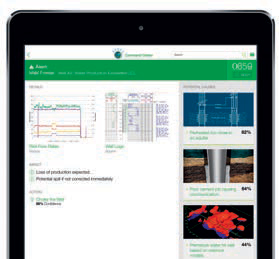 CHRONICLE by Ole Evensen, responsible for global upstream oil and gas strategy, IBMREADY FOR THE NEXT GENERATION"The rumours of my death have been greatly exaggerated!" This Mark Twain quote illustrates much of today's political debate on the oil industry as "history". Fortunately, many see an industry with opportunities, despite many challenges. | |||
Our biggest challenge is that continued growth requires adjustment. It's no longer good enough to be the best in the industry, when the industry itself is no longer a leader. Other industries have improved their competitiveness over the last ten years through innovation and new technology. During the period, the oil industry has fallen behind, relatively speaking. What can the Norwegian oil industry learn from leading global operators, or other industries? Integrated Operations (IO) was Norway's shining achievement, with considerable efforts devoted to organising data, visualisation and new operating models between offshore and onshore. Joint localisation broke down barriers between disciplines and yielded immediate advantages through better cooperation, sharing information and problem-solving. Ten years later – not much is new. Who can set new examples for the industry? | Australian oil company Woodside Energy wanted to share several decades of "Shutdown and Turnaround" experience with new employees. Using artificial intelligence (a cognitive analysis platform) they opened up new ways of analysing their experience data. They involved experienced engineers to illustrate important "questions and answers" in various disciplines, and in just six months, they developed a solution that understands the technical jargon of the industry. Their users can now ask open, freely formulated questions and get answers from the company's experience data – like humans would have responded. The example is very relevant for the Norwegian Shelf, which is facing a generational change. In the aviation industry, Pratt & Whitney analyses aircraft engines after each flight to assess the need for measures. An engine generates a half terabyte of data on every trip. This requires a similarly advanced analysis platform, as is the case for Woodside Energy. With an open digital platform, the oil companies could also give producers greater responsibility for their equipment, and thus reduce costs and downtime. | The health industry must continuously make better, faster diagnoses. A doctor-patient situation can be compared with an engineer's relationship to a reservoir, or production equipment. Everyone wants to understand a situation as well as possible by interpreting symptoms and conducting tests. The health industry pioneered the use of cognitive tools to better analyse unstructured data, such as journals, studies and diagnoses. Humans have historically had an advantage in processing this type of data, until we drowned in the sheer volume. New analysis technology that can interpret images is on the way. Images make up about 90%, and are the fastest growing type of data. Similarly, the oil industry could have analysed a specific issue of as many as 150,000 articles in the OnePetro database. An exploration prospect could have been illuminated with identified analogue reservoirs. Soon, if we want to, we will be able to "see" and analyse across text, images and seismic. | Fact: Cognitive data processing is different because it learns, understands natural language and has the ability to find connections in enormous quantities of unstructured data. IBM (International Business Machines)
|
A hypothetical example:In the illustration, a cognitive IO centre is notified about unexpected water penetration in a well. A role-adjusted analytical platform immediately provides all relevant information, to support decision-making: What happens, consequences, measures, data sources and probably causes. The causal analysis is cognitively unique. Hypotheses are ranked from analyses of historical data from relevant and comparable wells, reservoirs, installations. The ranking is made according to probability, with traceability to data sources and assessments. The example illustrates the opportunities that lie in technology currently used by other industries. With improved expertise and the willingness to change, the oil industry can use solutions like these. Why not get started? | |||

